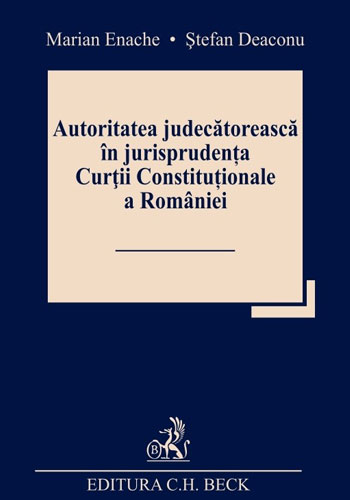
Abstract
The work is a point of reference regarding the legal system in Romania, based on the fundamental law of the state, the doctrine and a rich jurisprudence of the Constitutional Court, meant to highlight the functioning of the judicial authority in our country.
The main purpose of the contribution is to present the organization and functioning of the main judicial authorities (Courts, the Public Ministry and the Superior Council of Magistracy) and to illustrate the jurisprudence of the Constitutional Court for each judicial authority. Last but not least, the authors have created a broad theoretical framework to make the reader understand this complex topic.
The book is addressed to all legal specialists, whether we are talking about practitioners, theorists or even simple students, but it can also be a useful tool for those who are outside the field, but who want to know how justice works in our country.
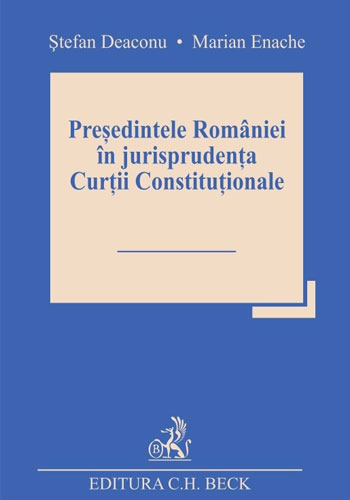
Abstract
The work deals with the issues related to the institution of the President of Romania, highlighted by the decisions of the Constitutional Court, important for the evolution of the institution. In the first part of it are analyzed important theoretical aspects regarding the institution of the president, and in the second part the relevant jurisprudence is presented, meant to explain and emphasize the relevance of the theory.
Initially are presented the provisions of the Romanian Constitution regarding the president, his functions, his acts or his responsibility, but also details his attributions in relation to the relationship with other state institutions and structures, so that, later, the relevant provisions are developed from a jurisprudential view.
The work aims mainly to identify legal and jurisprudential issues regarding the role, responsibilities, but also the limits within which they must be exercised, for a thorough understanding of the topic.
The book is addressed to all legal specialists, practitioners, theorists or even students – but also to those outside the field who want to find out about the institution of the President.
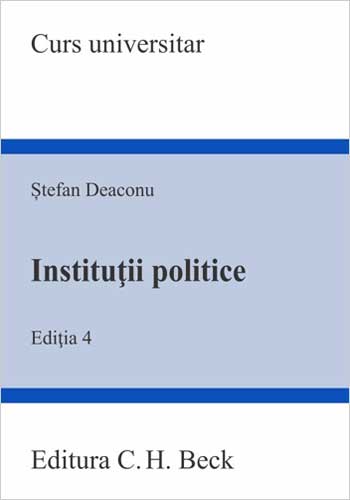
Abstract
Political institutions are institutions through which state power is exercised, these are forms through which political power is externalized. What determines the nature of political institutions is their ability to use power to achieve a general interest. In the absence of political institutions, power is exercised conjuncturally, arbitrarily and sometimes in conflict, by individuals. The true nature of political institutions lies in the place they give to the law, the guarantees of fairness and freedom that protect the lives and interests of citizens.
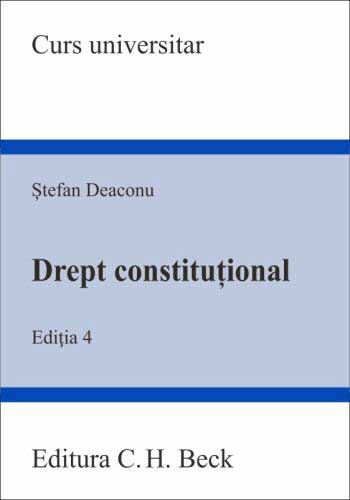
Abstract
„Mr. Ştefan Deaconu wrote a textbook about constitutional law with real scientific and didactic qualities. The effort of developing this work should be especially appreciated, because such a paper involves a difficult work of documentation and scientific construction in a dynamic branch of law, where the explanations involve a very high degree of abstraction.
The development of a constitutional law textbook involves not only information, analysis and construction, but also a great power to understand the constitutional phenomenon, to identify real issues, to maintain a balance between science and politics, being known that dealing with fundamental legal issues it can easily slip into politics, even politics.
If the state and the law are instruments for the realization of the policy, the legalization of the policy implies an ample scientific effort, an effort that supposes a great didactic, scientific and practical experience, and the present compendium rises to the level of these exigencies. The content of the ideas, the legal language used, the logic of the exposition and the clarity of the text are particularly impressive. These make it easier to deal with problems in the field.
We are therefore in the presence of a book of very high scientific level, which is addressed, with priority, to novice students in legal sciences, but which can be just as useful to both researchers and legal practitioners. “
Prof. univ. Dr. Ioan Muraru
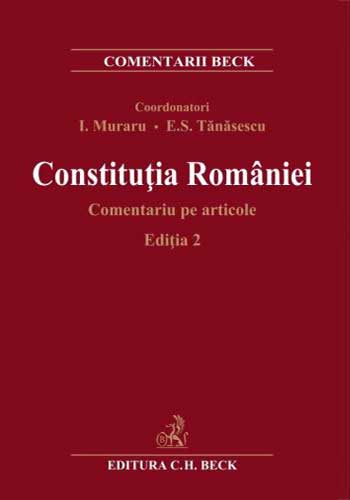
Abstract
Becoming in a short time a classic work in the field, the commented Romanian Constitution represents an indispensable guide for understanding the constitutional phenomena through the scope and accuracy of the analyzes.
The 2nd edition updates and enriches the information presented to the general public in the first edition, from 2008, of the commentary on articles of the Romanian Constitution.
The result of the collaboration of a prestigious team, coordinated by professors Ioan Muraru and Elena-Simina Tănăsescu, the new edition represents a substantial contribution to the field of constitutional law, subsuming in a coherent, systematic and comprehensive approach the defining elements for understanding the Constitution.
In the context of major divergences in political and social terms, the compendium is an essential landmark that fulfills the task of explaining and clarifying the theoretical and practical aspects of the field of constitutional law.
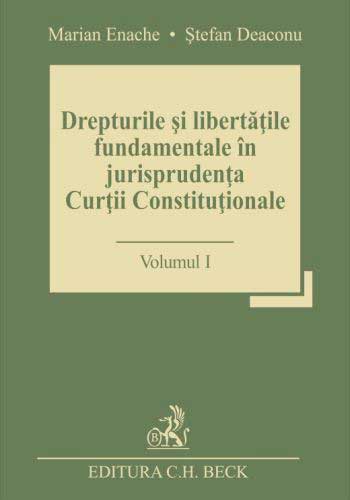
Abstract
The elaboration of this study was determined by the increased interest for the constitutional protection of fundamental rights and freedoms and for the activity of the Constitutional Court.
Designed to appear in several volumes, the work includes the considerations of principle resulting from the jurisprudence of the Constitutional Court on each fundamental right or freedom, with a proper indication of the decisions in which these considerations are found, as well as a brief doctrinal commentary on each fundamental right or freedom, accompanied by a bibliographic list of theoretical and practical works dealing with the issue of fundamental rights and freedoms.
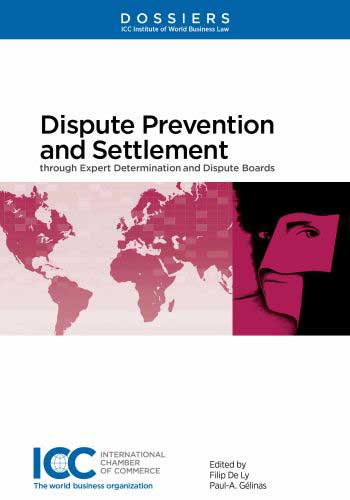
Crenguța Leaua – Contribution on “Independence and Impartiality of Experts in Expert Determination Proceedings”
Abstract
This book deals with dispute prevention and resolution through two specific methods: Dispute Committees and Expert Determination. These two methods are often used by the international business community to reduce the risk of being involved in lengthy and complex factual disputes.
Thirteen international experts share their knowledge and experience on the impact of applicable law, contract law issues, procedural issues and the relationship between Expertise or Dispute Commissions, on the one hand, and litigation and arbitration on the other.
Specific topics covered in the book include the challenges of determining experts in mergers and acquisitions, the selection of the expert by accounting firms, including real-life examples, and the rules of the 2015 ICC litigation commission, dispute resolution, including FIDIC contract forms, and recent case law on litigation commissions.
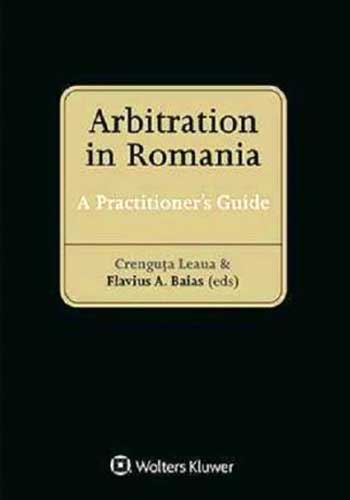
Abstract
This book aims to expand the knowledge of international practitioners on Romanian arbitration law, thus giving them the opportunity to reach the key concepts of the Romanian arbitration legislative framework, contained in the 7 chapters of the volume: investments and arbitration procedures, arbitration, the role of courts in arbitration and the choice of law in arbitration.
The detailed presentation of the current legal framework by practitioners in Romania provides perspectives on issues related to arbitration in Romania and important information on the development and current state of arbitration in Romania.
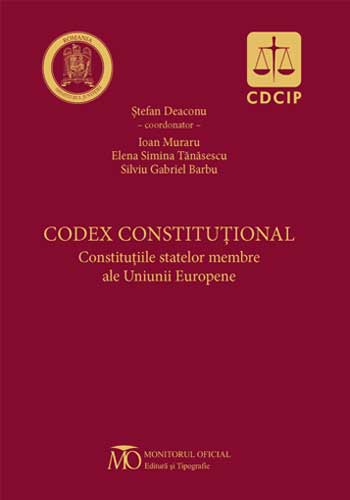
Abstract
The idea of this project came precisely from the desire to make available to those who want to participate in public life a document that includes all the constitutions of the Member States of the European Union, to ensure easy access to models that can help shape their beliefs. , supported in any effective form of dialogue on the Constitution.
This concept, unique in our opinion, presupposed the creation of a Codex that would include both the constitutions translated into the national language and their short presentations.
The work is carried out with the support of the World Bank, by recognized specialists in the field of constitutional law, university professors at the Faculty of Law of the University of Bucharest – Center for Constitutional Law and Political Institutions (CDCIP), partners of the Ministry of Justice in this project.
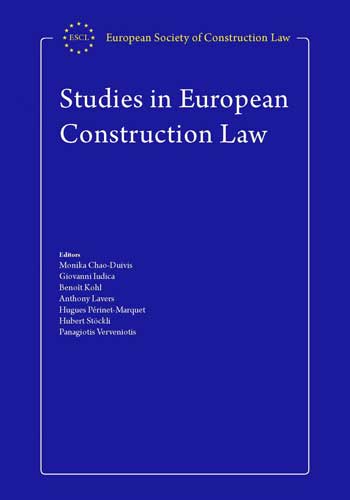
Crenguța Leaua, Ștefan Dudaș, Victor Stoica – “Romanian Construction Law” (contributions)
Abstract
This book, prepared under the auspices of the European Society of Construction Law, contains accounts of the law of twelve major European jurisdictions in relation to a number of construction issues.
Some are of a general nature, such as contracting, subcontracting and the respective obligations of the employer and the contractor, and others relate to specific aspects of contract performance: obligation to notify, payment, basement conditions, delay, disruption and settlement of damages. Liability issues and dispute resolution are also considered.
The work offers students and practitioners the opportunity to make comparisons between different approaches to common construction law issues in the jurisdictions represented.
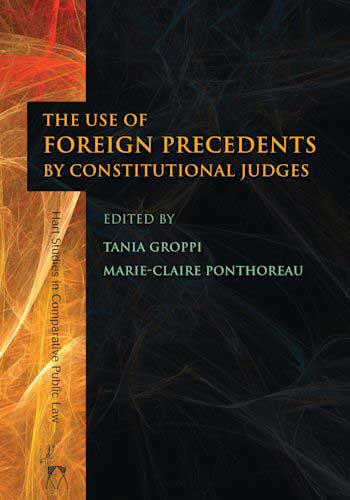
Ștefan Deaconu, Elena Simina Tănăsescu – Analogical Reasoning as a Dialectical Instrument
Abstract
In 2007, the International Constitutional Law Association set up an Interest Group on “The Use of Foreign Precedents by Constitutional Judges” to conduct a study on the use of foreign precedents by Supreme and Constitutional Courts in resolving constitutional cases.
Its purpose was to determine – by empirical analysis using both quantitative and qualitative indicators – the extent to which foreign jurisprudence is cited. The survey aimed to test the reliability of studies describing and reporting cases of cross-border communication between courts.
The research also provides useful insights into the extent to which progressive constitutional convergence between common law and civil law traditions can take place.
This work includes studies by researchers from African, American, Asian, European, Latin American, and Oceania countries, representing jurisdictions belonging to both common law and civil law traditions, and countries using both centralized and decentralized judicial control. The results, published here for the first time, give us the best evidence so far of the existence and limits of a transnational constitutional communication between courts.
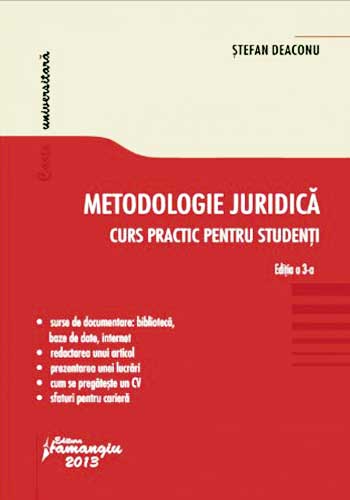
Abstract
At the beginning of their career, students inevitably face a whole series of difficulties that they have to solve quite quickly. To clarify these issues, the legal methodology comes to guide the steps of those who want to decipher the secrets of law and familiarize them with some legal rigors.
Like any profession, the profession of lawyer requires a thorough training, but also a thorough understanding of some principles and mechanisms that affect the profession. There are many theoretical things that law students study, but without learning how to apply them.
The purpose of this study book is to give them instructions on how to interpret a legal text, write a scientific paper, prepare a scientific paper for the year, search for the bibliography for the study, prepare a CV or a letter. of intent.
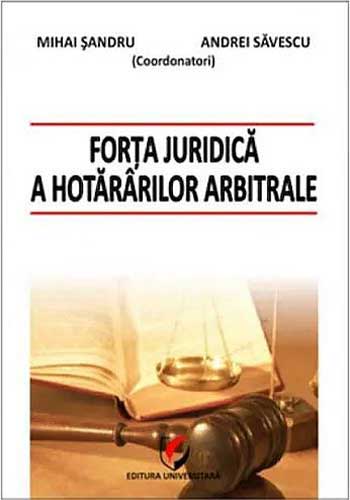
Crenguța Leaua – The Relationship Between the Place of Arbitration and the Qualification of an Arbitration Award as Being National or Foreign (contribution)
Abstract
The legal force of arbitral awards is a volume that brings together important contributions of Romanian and foreign academics and practitioners.
The work was initiated following the conference on the same topic organized by the Society of Legal Sciences in 2011 and has studies dedicated to commercial arbitration in the context of European Union law, analysis of arbitration rules in comparative law (Greece and Brazil), jurisprudential issues of recognition and enforcement foreign arbitration awards in Romania, but also the enforcement of a judgment by a Romanian creditor abroad, reduction of arbitration fees in arbitration, organization of the arbitral tribunal, interim measures in international arbitration and settlement of arbitration issues.
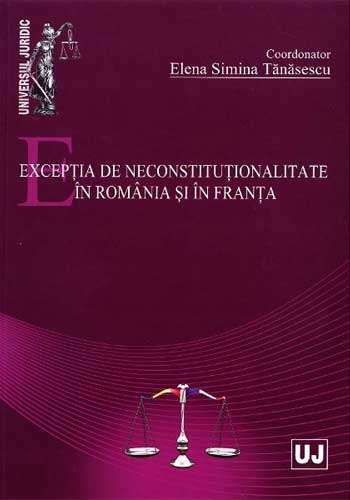
Crenguța Leaua – The Exception of Unconstitutionality and Commercial Arbitration. Some Practical Aspects. (contribution)
Ștefan Deaconu – Constitutionality CControL of the Abrogated Legal Norms – Cause of the Legal Conflicts of Constitutional Nature Between the Public Authorities (contribution)
Abstract
This publication aims to make accessible to the interested public the materials resulting from the oral contributions presented during the debate entitled “100 Years of Unconstitutionality ExceptionS in Romania” , organized by the Center for Constitutional Law and Political Institutions of the University of Bucharest, in partnership with the Association Franco-Romanian jurists.
The event took place on the occasion of the 100th anniversary of the final decision of the court given on the first exception of unconstitutionality known to the Romanian legal system, in the famous “Bucharest tram business” from 1911 – 1912
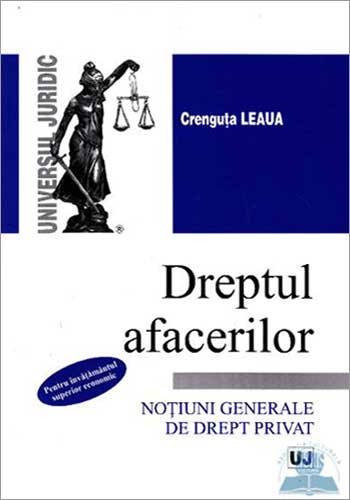
Abstract
The book is designed for students in higher economic education programs, whose university analytical program includes the discipline “Business Law”. However, the book is also useful for those people who want to get acquainted with the basic notions of business law, for their professional activity, mainly for people involved in various economic activities.
The work is also of interest for updating the general knowledge of law of graduated economists, after the publication of the new Civil Code, the book following the structure of the general information that was presented in the course of business law that they followed during prior university studies.
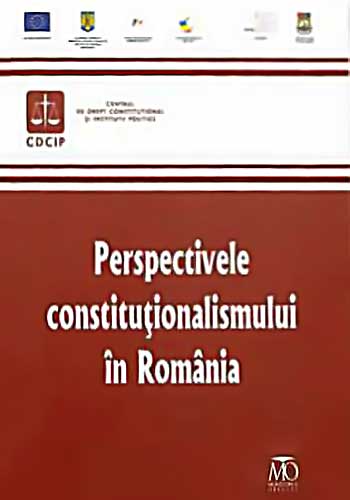
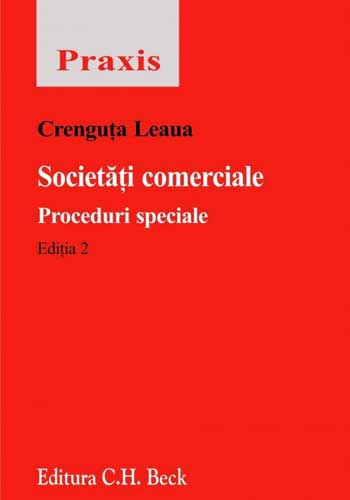
Abstract
The second edition of the paper reflects the latest amendments to the legislation governing the establishment of companies and the amendment of their articles of association, the modification of associates, the operation, dissolution, liquidation and deregistration of companies, as well as the liability of individuals for business activities, including on new methodological rules on how to keep business records, record and release information.
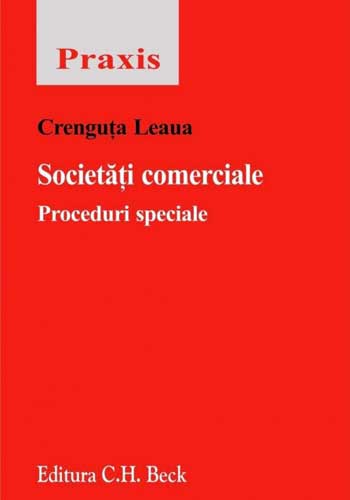
Abstract
The paper is a monographic study of the actions regarding the establishment of the companies and the modification of their constitutive acts, the modification of the associates, the functioning of the companies, their dissolution, liquidation and deletion, as well as the liability of some persons for the activity carried out within the companies.
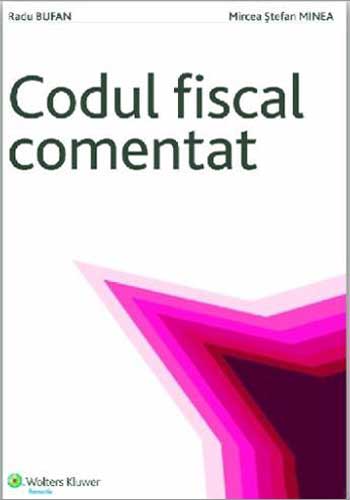
Abstract
The Commented Fiscal Code totals 1400 pages of updated legislation, comments and jurisprudence, being designed by a team of 27 authors, reputable tax specialists, academics, lawyers, specialists from the Ministry of Economy and Finance, consultants and tax lawyers , under the coordination of two of the most prestigious financiers: Prof.Dr. Radu Bufan and Prof.Dr. Stefan Minea.
The current tax provisions are analyzed from the perspective of tax practitioners, offering solutions for the complex cases they face every day.
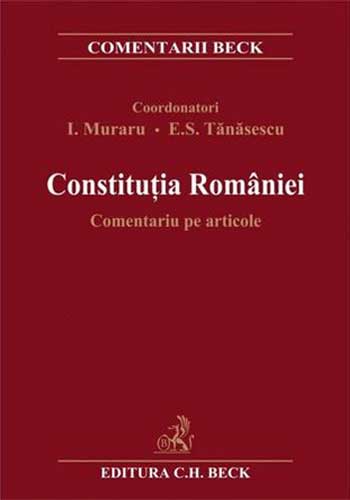
Abstract
A complex, multidisciplinary work, knowing that a fundamental law is the main source of all branches of law.
This work was carried out by lawyers recognized for their professional and scientific qualities, driven by a common idea, namely to explain the constitutional texts so as to highlight their efficiency and viability in the 17 years of application.
The work, meant to answer questions and clarify the ambiguities of Romanian readers and citizens in general, capitalizes on many of the ideas presented in the comments after the referendum approval of the Constitution, but also the practice of applying constitutional texts, rich doctrine and the jurisprudence of the Constitutional Court.
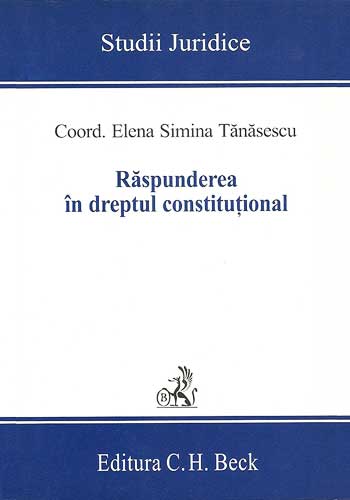
Abstract
This book brings to the attention of the general public the scientific communications and debates that took place during the seminar on “Responsibility in Constitutional Law”, organized on June 21, 2006 by the Center for Constitutional Law and Political Institutions in collaboration with the People’s Advocate.
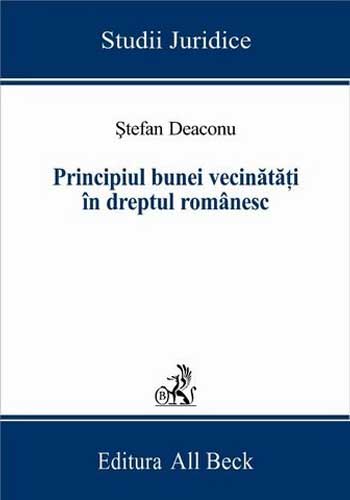
Abstract
The book examines how the principle of good neighborliness has been established in international relations, highlighting the features of this principle, its content and the areas of application of the principle of good neighborliness in international relations.
The recipients and beneficiaries of the principle of good neighborliness are identified, the legal acts of promotion and application of this principle, and then to be addressed, based on a careful analysis, the specific problems of Romania, how this principle has proven its effectiveness in international relations. .
With great accuracy, but also on the basis of exceptional information, the author analyzes issues as complex and delicate as possible, such as the problem of Snake Island, the Cadrilater, the treasure of Romania held Moscow, the problems of minorities, the Romanian-Greek relations, etc.
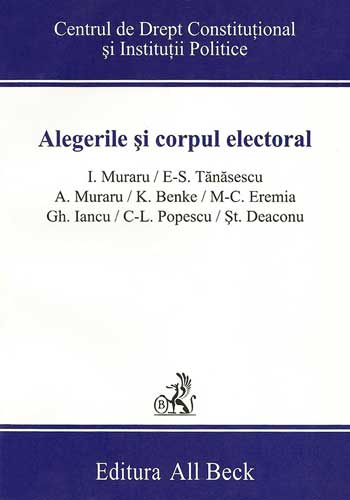
Elections are the procedure by which the people, the holder of national sovereignty, appoint their representative authorities: the Chamber of Deputies, the Senate, the President of Romania, the mayors, the local councils. They must be free, regular and fair.
The electorate includes a part of the population, its politically active and mature part. Minimum age to vote is 18. The electorate is interested in: setting up representative authorities; validity of electoral actions (electoral majorities). It is the decision-making component of the people. It is the only original power, on the basis of which the very power and authorities of the state are legitimized and constituted. He must be educated and properly informed.
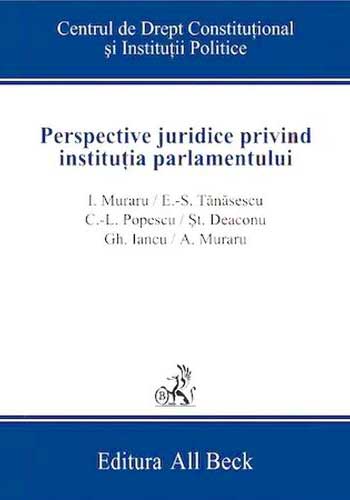
Abstract
Parliament is a representative and deliberative institution, representative by its composition, deliberative by its mode of functioning; today it is a “common good” that is equally appropriated by the political scene and the legal field. The subject of this book was the topic of a debate of the Center for Constitutional Law and Political Institutions, where the materials published here were presented.
Their authors present recent or perspective aspects, purely theoretical issues or results directly from parliamentary practice, in an extremely open and imaginative manner.
From the analysis of some details of the new legislative procedure established as a result of the revision of the Romanian Constitution in 2003, to proposals for a law on a voting method that would use state-of-the-art technological means, going through specifying new aspects – results from practice – of legislative delegation and parliamentary immunity, the book even includes a rigorous analysis of a topical issue concerning the internal organization of the permanent offices of the Houses of Parliament.
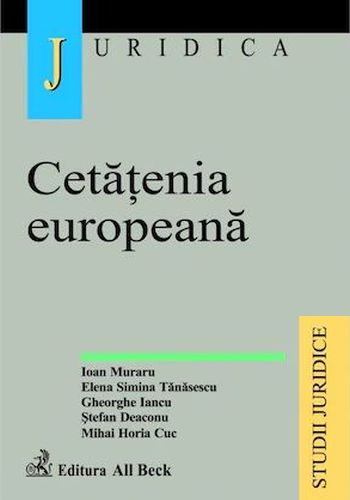
Abstract
“European citizenship. Citizens, foreigners and stateless persons in Romanian and European law” appears under the auspices of the Center for Constitutional Law and Political Institutions (CDCIP) created within the Department of Public Law of the Faculty of Law, as a scientific formula used for organizing seminars and debates on current constitutional issues.
It is focused on the topic of European citizenship and the influence it could have on the Romanian legal system, gathers in its content four studies of the most valuable representatives of the Romanian School of Constitutional Law (Correlation between national citizenship and European citizenship; statelessness and statelessness; Romanian citizenship; the participation of foreigners in the process of democratization of society, an essential component of a united Europe.)
Postgraduate study book